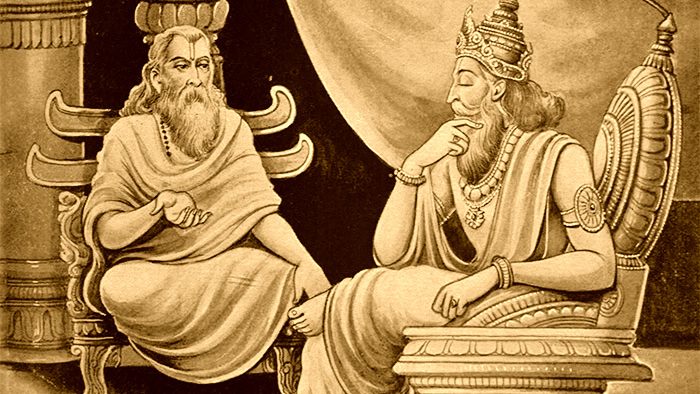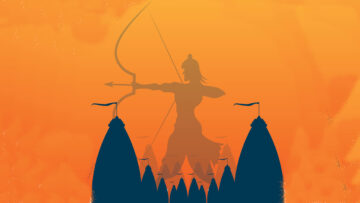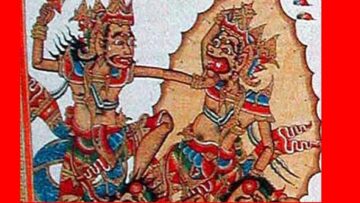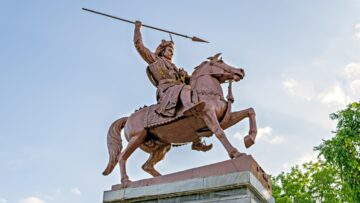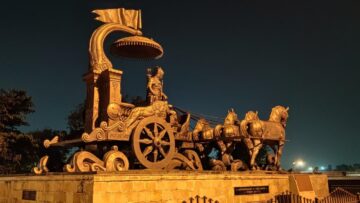So far we have covered three chapters – 254 of 541 shlokas – or a little less than half of Vidura Niti in the previous six posts. As an aside, Vidura Niti is contained entirely in the Prajagara Parva. The following Parva is Sanatsujata Parva, which is equally fascinating. But coming back to Vidura Niti, in the previous post, Vidura talked of the consequences of lying as a witness using the story of Sudhanva, Virochana, and Prahlada.
In this chapter, Vidura reinforces his point by narrating the history of the conversation between the son of Atri and the Sadhyas to Dhritarashtra. The gods, the Sadhyas, wanted to know from Atreya who he was and to hear words of wisdom and dharma. Among the things that Atreya told the Sadhyas, one was on harsh words. Atreya’s advice was to not retort to harsh words, for that “torments the one who reviles and you enjoy the fruits of his good deeds.”
Atreya said that “one is accordingly colored by one’s associates” – whether one associated with an ascetic or thief. The allusion to the company Dhritarashtra’s son kept cannot be missed here. Enough harsh words had been uttered by Duryodhana in the game of dice, and it is here that Atreya’s words are worth noting:
“First, it is better not to speak than to speak. Second, if one speaks, one should speak the truth. Third, if one speaks, one should say that which is pleasant. Fourth, if one speaks pleasant truth, it should be in accordance with dharma.”
अव्याहृतं व्याहृताच्छ्रेय आहुः; सत्यं वदेद्व्याहृतं तद्द्वितीयम्
प्रियं वदेद्व्याहृतं तत्तृतीयं; धर्म्यं वदेद्व्याहृतं तच्चतुर्थम् [5.36.12]
Remember the verses from the Brihadaranyaka Upanishad (4.4.5) about we being what our “deep, driving desires are”? Vidura Niti echoes the same philosophy, slightly expanding on it:
“A man becomes like the one he converses with, like the one he serves, and like the one, he wishes to be. One becomes free of whatever one keeps oneself away from. By turning away from everything, the least bit of unhappiness vanishes.”
यादृशैः संविवदते यादृशांश्चोपसेवते
यादृगिच्छेच्च भवितुं तादृग्भवति पूरुषः[5.36.13]
यतो यतो निवर्तते ततस्ततो विमुच्यते
निवर्तनाद्धि सर्वतो न वेत्ति दुःखमण्वपि [5.36.14]
So, just as discipline and will-power are among the signs of the ‘superior’ person (we covered this earlier), Atreya also describes the signs of a ‘medium man’ and ‘worst man’. Some of the attributes of such a ‘worst’ person are worth enumerating (sort of like an anti-pattern in software design!):
- “He who is difficult to control
- He who strikes back instead of being instructed
- He who cannot control himself when overcome by anger
- He who is ungrateful
- He who is without friends and evil-souled
- He does not appreciate the good things done by others
- He is distrustful of himself
- He drives away his friends”
Having heard these words about the conduct of good and evil people, the virtues of associating with good people, and of self-discipline, Dhritarashtra wanted to know what made a lineage great. In Vidura’s estimation, there were seven qualities that made a lineage great:
- “austerity
- self-control
- knowledge of the brahman
- sacrifices
- purity
- marriages
- constant donation of food”
Just as a syandan tree is strong enough for chariots’ wheels to be made from its wood, similarly, those born in “great lineages can bear great burdens that other men cannot.”
Vidura then changed to the subject of friends – who is a friend, how does a friend behave, what does he do and what he doesn’t, and so on. Interestingly enough, Vidura maintains that “Whether one is rich or poor, one must always ask favors from friends. Without asking, one does not know whether the friends are deep or shallow.” This reminded me of the English proverb – “a friend in need is a friend indeed.”
Dhritarashtra knew, and acknowledged as much to Vidura, that Yudhishtira had been treated unfairly and that he would destroy his sons (the Kauravas) if they met on the battlefield. This was breeding great anxiety in the king’s mind. Vidura maintained that the only way to get peace, drive away fear, and knowledge was via yoga, intelligence, and service of one’s preceptors.
In a very intriguing metaphor, Vidura compares relatives to threads, long and thin. “When they are joined together because they are many, they can bear a large load. … Relatives are like kindling. When separated, they produce smoke (presumably to mean that while they may inconvenience, they pose no great danger). But when they are together, they blaze.”
Which is why it was important for relatives – the Pandavas and Kauravas – to be united. Just as a single tree, even if large but standing alone, could be brought down by the wind, similarly, a single man was capable of being defeated.
Recall that in an earlier chapter, Vidura had said that the rich often could not savor food (because of diseases), while the poor could obtain taste even from wood, he reinforces the point in this chapter by telling the king that the greatest quality in a person was that he be without disease. Even if one was without the disease, anger was like a headache (and thereby akin to a disease). People afflicted with disease knew neither satisfaction nor happiness.
With this advice, Vidura once again pleads with the blind king to preserve his fame by entering into an alliance with the Pandavas and to restrain Duryodhana.
Reference:
Excerpts from Bibek Debroy’s unabridged, ten-volume, English translation of the Bhandarkar Oriental Research Institute’s Critical Edition of the Mahabharata, published by Penguin from 2010 to 2015. The excerpts here are from volume 4. The Sanskrit verses are John Smith’s revision of Prof. Muneo Tokunaga’s version of the text, and available online at https://bombay.indology.info/
Disclaimer: Views expressed are personal.
Explore Tales from the Mahabharata: Vidura Niti Part I, II, III, IV, V, and VI
Disclaimer: The opinions expressed in this article belong to the author. Indic Today is neither responsible nor liable for the accuracy, completeness, suitability, or validity of any information in the article.

